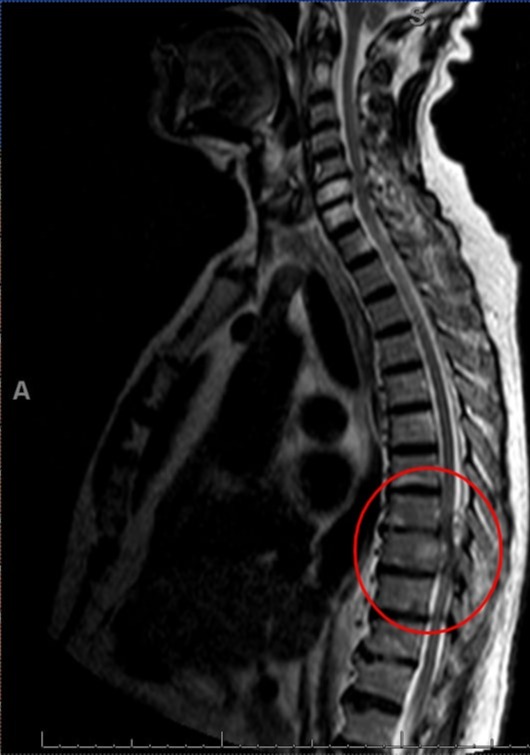Back


Poster Session C - Monday Afternoon
Category: Colon
C0114 - A Deadly Presentation of Constipation
Monday, October 24, 2022
3:00 PM – 5:00 PM ET
Location: Crown Ballroom

Has Audio

Sarah Elrod, DO
Abington-Jefferson Hospital
Abington, PA
Presenting Author(s)
Sarah Elrod, DO1, Stephanie Tzarnas, MD1, Shravya Ginnaram, MD2, Priyanka Sachdeva, MD3
1Abington-Jefferson Hospital, Abington, PA; 2Abington-Jefferson Health, Abington, PA; 3Gastrointestinal Associates, Abington, PA
Introduction: Constipation is typically due to one of several functional GI disorders or medication use. However, it is important to remain vigilant for rarer causes of constipation that can have deadly outcomes. Here we describe one such diagnosis in a patient who presented with constipation and was found to have severe spinal cord compression due to a spinal mass.
Case Description/Methods: A 69-year-old male presented to the ER with 12 days of constipation. Prior to coming in he had been to numerous medical facilities because he was having back pain and worsening constipation. He had tried multiple laxatives and enemas without relief, CT imaging was done but did not show a source. In the ER he failed magnesium citrate, multiple fleet and tap water enemas and a manual fecal disimpaction, so the decision was made to admit him.
He was seen by gastroenterology who started him on a gentle large bowel prep. The next morning, he was having watery bowel movements without stool, however legs were now weak to the point that he could not stand. A stat MRI showed severe cord compression at T8 and T9 due to a destructive lesion involving the T9 vertebral body (Figure 1). Within hours the patient was rushed to the OR for emergent spinal cord decompression. A posterior purple-gray epidural mass was removed, and later pathology revealed an undifferentiated pleomorphic sarcoma. He started on radiation, however was found to have multiple sites of metastasis, transitioned to hospice care, and passed away
Discussion: Due to innervation patterns in the spinal cord lesions above S1 can result in constipation. The first pathway is loss of sensation in the rectum resulting in loss of signal to evacuate and rectal distention. The second pathway is the loss of conscious external anal sphincter control, the inhibitory pathways remain activated, resulting in an inability to relax the anal sphincter and evacuate.
With spinal cord compressions patients can also present with back pain, motor weakness, sensory deficits (i.e. saddle anesthesia) and loss of bladder function. Laxatives and enemas tend to be ineffective on these patients due to the external anal sphincter dysfunction and manual disimpaction has a higher success rate for symptom relief. Definitive management in these patients requires surgical intervention for decompression.
When working up constipation it is important to ask a full review of symptoms to rule out non-primary causes and potentially catch red flags.

Disclosures:
Sarah Elrod, DO1, Stephanie Tzarnas, MD1, Shravya Ginnaram, MD2, Priyanka Sachdeva, MD3. C0114 - A Deadly Presentation of Constipation, ACG 2022 Annual Scientific Meeting Abstracts. Charlotte, NC: American College of Gastroenterology.
1Abington-Jefferson Hospital, Abington, PA; 2Abington-Jefferson Health, Abington, PA; 3Gastrointestinal Associates, Abington, PA
Introduction: Constipation is typically due to one of several functional GI disorders or medication use. However, it is important to remain vigilant for rarer causes of constipation that can have deadly outcomes. Here we describe one such diagnosis in a patient who presented with constipation and was found to have severe spinal cord compression due to a spinal mass.
Case Description/Methods: A 69-year-old male presented to the ER with 12 days of constipation. Prior to coming in he had been to numerous medical facilities because he was having back pain and worsening constipation. He had tried multiple laxatives and enemas without relief, CT imaging was done but did not show a source. In the ER he failed magnesium citrate, multiple fleet and tap water enemas and a manual fecal disimpaction, so the decision was made to admit him.
He was seen by gastroenterology who started him on a gentle large bowel prep. The next morning, he was having watery bowel movements without stool, however legs were now weak to the point that he could not stand. A stat MRI showed severe cord compression at T8 and T9 due to a destructive lesion involving the T9 vertebral body (Figure 1). Within hours the patient was rushed to the OR for emergent spinal cord decompression. A posterior purple-gray epidural mass was removed, and later pathology revealed an undifferentiated pleomorphic sarcoma. He started on radiation, however was found to have multiple sites of metastasis, transitioned to hospice care, and passed away
Discussion: Due to innervation patterns in the spinal cord lesions above S1 can result in constipation. The first pathway is loss of sensation in the rectum resulting in loss of signal to evacuate and rectal distention. The second pathway is the loss of conscious external anal sphincter control, the inhibitory pathways remain activated, resulting in an inability to relax the anal sphincter and evacuate.
With spinal cord compressions patients can also present with back pain, motor weakness, sensory deficits (i.e. saddle anesthesia) and loss of bladder function. Laxatives and enemas tend to be ineffective on these patients due to the external anal sphincter dysfunction and manual disimpaction has a higher success rate for symptom relief. Definitive management in these patients requires surgical intervention for decompression.
When working up constipation it is important to ask a full review of symptoms to rule out non-primary causes and potentially catch red flags.

Figure: MRI of the thoracic spine showing destructive lesion of T9 with spinal cord compression
Disclosures:
Sarah Elrod indicated no relevant financial relationships.
Stephanie Tzarnas indicated no relevant financial relationships.
Shravya Ginnaram indicated no relevant financial relationships.
Priyanka Sachdeva indicated no relevant financial relationships.
Sarah Elrod, DO1, Stephanie Tzarnas, MD1, Shravya Ginnaram, MD2, Priyanka Sachdeva, MD3. C0114 - A Deadly Presentation of Constipation, ACG 2022 Annual Scientific Meeting Abstracts. Charlotte, NC: American College of Gastroenterology.
